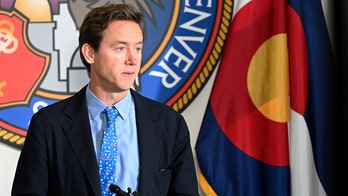A Tunisian man arrested in connection with the deadly attack Sept. 11 on the U.S. Consulate in Libya was identified by the internal surveillance video recorded during the attack, senior U.S. intelligence officials told Fox News.
Ali Ani al Harzi and one other suspect were detained at an airport in Turkey in the days after the attack while travelling with false documents, and Harzi now has been identified as being present at the attack using the images obtained from the consulate compound video, Fox News' sources say.
Ambassador Chris Stevens and three other Americans were killed in the attack, which is thought to have been carried out by a local Libyan extremist group known as Ansar al-Sharia.
Harzi was transferred to Tunisian custody, but U.S. interrogators so far have not had access to him, much to the frustration of American authorities. Even so, U.S. intelligence agencies have confirmed through facial recognition technology that the Tunisian was present the night of the consulate attack.
Sen. Saxby Chambliss blamed the Obama administration for the inability to question Harzi.
"This individual in the hands of Tunisians is a classic example of what happens when you have lack of policy for detention for interrogations," Chambliss, R-Ga., said. "Once the president in January of 2009 signed the executive order, saying we are going to shut down Guantanamo ... there are no policies in place to take possession and interrogate him in a way to gain valuable information."
The State Department has not commented on why it has not been able to secure access to the Tunisian attacker.
"The president's made clear, the secretary's made clear that we are intent on figuring out who did this and bringing the perpetrators to justice. But I'm not going to get into the details of who and how," State Department spokeswoman Victorian Nuland said last week.
Meanwhile senior military sources tell Fox News the two Predator drones deployed over Benghazi the night of the attack were both unarmed. The first Predator was redirected from Darnah in eastern Libya, where Al Qaeda has active training camps that the U.S. military has been watching for some time, U.S. intelligence sources tell Fox News. It arrived in Benghazi about an hour after the attack began, suggesting the first hour of the attack was not fed back to officials in Washington.
That drone was running low on fuel, so a second Predator, also unarmed, was deployed from Sigonella, Italy, to provide back-up. It is not clear why the second drone left Sigonella unarmed after the attack had begun.
"While some may think that armed drones could have made a difference in Benghazi, that's altogether unclear," a senior defense official tells Fox News. "You need good intelligence to drive the use of armed drones. It's not like you can just send hellfire missiles into a relatively crowded area when you don't know precisely where the enemy is."




